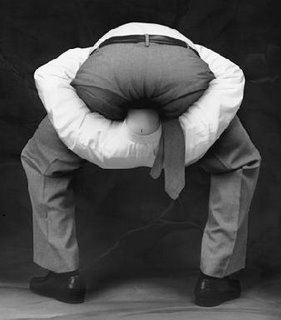 While many lefty bloggers out there have quite rightly focused on the idiocy of Cokie Roberts lambasting Barack Obama for taking a vacation in “that foreign, exotic location” of our 50th state, Hawaii by name, I would like to return to some of her lightweight analysis (along with husband Steve) that appeared in the Bucks County Courier Times on the matter of “hard versus soft power” under Bushco…
While many lefty bloggers out there have quite rightly focused on the idiocy of Cokie Roberts lambasting Barack Obama for taking a vacation in “that foreign, exotic location” of our 50th state, Hawaii by name, I would like to return to some of her lightweight analysis (along with husband Steve) that appeared in the Bucks County Courier Times on the matter of “hard versus soft power” under Bushco…As (Defense Secretary Robert) Gates told the Global Leadership Campaign, it was not just “America's military forces and intelligence capabilities” that “held the Soviets at bay for more than four decades.” There was also the Agency for International Development working to pull people out of poverty, diplomats defusing dicey situations, and the presence of the U.S. Information Agency providing a place to learn about “our history and culture and values.”Cokie, darling, I hate to break the news to you, but Bill Clinton hasn’t been president since January 20th, 2001. Since then, your boy Dubya has had plenty of time to try and utilize “soft power” to win hearts and minds, and we all know the result (yes, Roberts has a point about the USIA and the State Department, but that’s ancient history).
But, Gates told NPR, that all changed after the Soviet Union fell apart. “When the Cold War was at its height, the U.S. Agency for International Development had something like 16,000 employees. It has 3,000 now. One of the points that I make, if you took all the Foreign Service officers in the world — about 6,600 — it would not be sufficient to man one carrier strike group.” Cutbacks in personnel plus the Clinton administration's decision to fold the USIA into the State Department left the “soft power” institutions in a sorry state.
This post from The Swamp (of the Chicago Tribune’s Washington bureau) from October 2007 tells us of the departure of Karen Hughes, the former Undersecretary of State for Public Diplomacy and Public Affairs, appointed by President Highest Disapproval Rating In Gallup Poll History.
So, what did she do, exactly?
The AP reports that "Hughes dispatched Arabic speakers to do four times as many interviews with Arabic media as in previous years and set up three rapid public relations response centers overseas to monitor and respond to the news.And in addition to this, Hughes sent former Olympics ice skater Michelle Kwan and Baltimore Orioles great Cal Ripken abroad as “goodwill ambassadors” (who, as far as I know, don’t speak Arabic either, like Hughes).
But as a result of these brilliant moves (in addition to bloating her department’s budget to $900 million)…
"Polls show no improvement in the world's view of the U.S. since Hughes took over,'' AP notes. "A Pew Research Center survey earlier said the unpopular Iraq war is a persistent drag on the U.S. image and has helped push favorable opinion of the United States in Muslim Indonesia, for instance, from 75 percent in 2000 to 30 percent (in 2006). ''So it sounds like Bushco didn’t do such a hot job with trying to “win hearts and minds” (part of Cokie’s “soft power”) also.
And in the Swamp story, we see Our Gal Condi Rice, who didn’t think the Russia-Georgia War (which, thankfully, may be subsiding, with Sarko's help) was important enough to interrupt her vacation, (maybe she's buying shoes?) witnessing Hughes’ farewell. And Rice has her own “soft power” issues, as noted here; she was encouraged by Dem U.S. House Rep Gary Ackerman from New York to hire to the State Department the gay linguists dismissed by the Pentagon (some of whom are surely conversant in Arabic) as part of the “Don’t Ask, Don’t Tell” fiasco (no word on whether Rice ever did so – I expect not).
And this Common Dreams article reminds us of the following…
World opinion, dismissed by top Bush officials, has undermined U.S. clout, said Joseph Nye, a professor of international relations at Harvard University.Yes, Clinton rolled the USIA into the State Department after the Berlin Wall fell and communism collapsed. But it is hardly his fault that the person who followed him in office had neither the will, guidance, or basic intelligence to realize that the fight against a new enemy required a new strategy, utilizing assts from the military, political and civilian, corporate communities.
Bush's emphasis on force has cost goodwill around the world -- nowhere more than among Muslims -- and squandered the sympathy that empowered the United States to invade Afghanistan after the Sept. 11 attacks.
"A president has to be able to combine the hard power of military force with the soft power of attracting others to want to follow us," Nye said. "In fighting a struggle against terrorism -- where everything depends upon winning the hearts and minds of moderates -- that loss of soft power is very expensive. The key to diplomacy is to divide your enemies, and Bush has in a sense united our enemy."
They are no longer “history’s actors,” and never were, really. But like all actors, their time grows short on the stage, if you will. And since they cannot make a graceful exit, all that remains is for them to leave quickly and do as little further damage as possible.
No comments:
Post a Comment